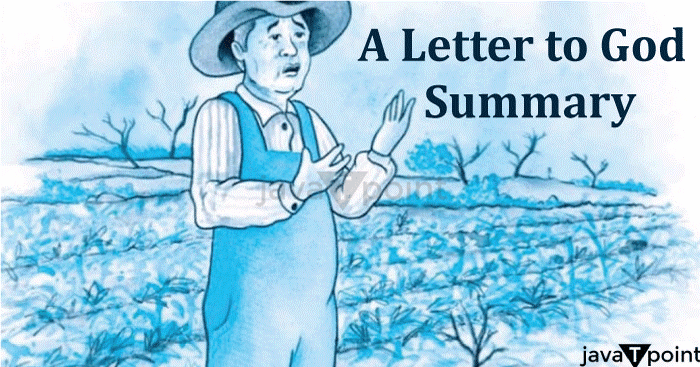A Letter to God SummaryThe story "A Letter to God" by G.L. Fuentes is about having absolute faith in anything. The plot takes place in a Latin American country. After discovering his entire crop yield devastated by a terrible hailstorm the story's protagonist, Lencho, writes a letter to God asking for rescue from the Almighty. Even though his requests are partial if not granted he is resentful. He challenges the honesty and modesty of the postmasters who provided him with money (anonymously) in the name of God. 
"A Letter to God" is an age-old story which inspires us to consider the nature of faith and how we seek comfort and guidance in the face of adversity. About the AuthorGregorio L�pez Fuentes (November 17, 1897 - December 10, 1966) was a novelist, poet, and journalist from Mexico. He was a prominent chronicler of the Mexican Revolution. He became acquainted with the Indians, farmers, and workers of America's regional lives, which he later portrayed in his works. After being unsuccessful in poetry and novels, he began to draw on his experiences during the Mexican Revolution. He then became a literature teacher at a school in Mexico City. In 1921, he began writing for El Universal under the Tulio F. Peseenz. His stories were regarded as adventurous, amusing, and representative of Mexico. As a realist, many of his writings dealt with Native American injustice. Mariano Azuela and Martn Luis Guzm�n were his contemporaries. Campamento (Encampment) was his first hit in 1931. Tierra (Earth), a novel about Mexican rebel Emiliano Zapata was published in 1932 and Mi General! (My General!) in 1934 which is a work about the lives of generals after the Revolution. El Indio (The Indian), published in 1935, is a fictional account of the life of Mexico's indigenous population. In 1935, he received the National Prize in Arts and Sciences. 
In fact, Lencho had a great faith in God. Despite the fact that he deviated from the path of the shortest distance in order to obtain assistance, he was successful. As a result, we may claim that if someone has high faith, his wish is most likely to be granted. The wish may be granted entirely or partially. This is the story of Lencho, a hardworking farmer. If it rains, he expects a good crop this year. The rain does arrive, bringing with it a brief period of happiness. However, the rain turns into a hailstorm, which destroys all of his crops. He seeks God because he is severely harmed. With unwavering confidence in God, he writes a letter to Him requesting one hundred pesos. Characters of the StoryLenchoA poor farmer and his family live on the peak of a low hill. He was a devout follower of God. He is innocent, hopeful, concerned, and accountable. PostmasterA big, friendly guy who helped Lencho keep his faith in God. On God's behalf, he donated a portion of his salary to Lencho's charity. Employees of the Post OfficePeople who assisted Lencho at the postmaster's request. When they saw the letter, they laughed at Lencho yet supported him in his time of need. Lencho described them as a bunch of crooks. SummaryG.L. Fuentes' story A Letter to God illustrates the devoted trust of a poor and innocent minded farmer named Lencho. Lencho was a poor but hardworking farmer. He was hoping for a good crop. To his dismay, a hailstorm destroyed all of his crops and production. The poor farmer was caught aback and depressed by the damage. However, He have a profound faith in God. He was a well-educated man who could read and write. He was persuaded that God would undoubtedly help him because of his honest personality. As a result, he resolved to write a letter to God, addressing his financial issues. In the letter, he pleaded God to provide him one hundred pesos so that he could resow his crops and prevent his family from starvation. He quickly prepared a letter and rushed to the post office. He stamped the letter and placed it into the mailbox. 
After reading the letter, the postman laughed heartily as he took it from the letterbox. He raced up to the postmaster and showed him the weird letter. The postmaster read the letter but burst out laughing when he realised it was addressed to God. However, he was impressed by the farmer's faith. He admired the impoverished farmer's persistent trust in God and decided to assist him. Soon after, he instructed the post office employees to contribute some money as charity and also gave a portion of his income so that Lencho's trust in God would not be weakened. However, the money collected was little less than what Lencho had pursued from God. After that, the postman placed all of the money collected in an envelope and delivered it to the poor farmer. The next Sunday, Lencho went to the post office to see whether there was any mail for him. The mail was presented to him gently by the postmaster. Lencho was not surprised to discover a letter with money inside the mail. He confidently opened the envelope to count the money but got angry when he discovered it contained only seventy pesos. He was certain that God could never have made such a terrible mistake. He ran to the window and asked for paper and ink, then written another letter to God and dropped it in the letterbox. When Lencho left, the postmaster quickly opened and read his letter. In it, Lencho complained to God that he was initially asking for one hundred pesos but was disappointed to find just seventy pesos. Furthermore, he criticised the post office staff for believing that they had taken the remaining thirty pesos from his package. He urged God to give him the balance of the money because he was in desperate need of them. However, he asked God not to send the money over the mail because Lencho believed that the post office employees were "a bunch of crooks" who might have taken the rest of the money from the envelope. Some Themes of "A Letter to God"FaithFrom beginning to end, the story covers the concept of faith and how it can be challenged in times of hardship. Lencho's persistent confidence in God inspires him to write a letter to God. This faith drives every aspect of the the story. HumanityWe witness the post office staff showing remarkable humanity in order to retain the writer's faith. Even in the face of adversity, Lencho stays humble. Despite losing his whole crops, he remains hopeful that God will provide for him and his family, and he expresses gratitude to God. This is what humanity is all about. The Power of NatureThe story emphasises nature's strength and unpredictability, as well as how it can have drastic effects on people's lives. The unexpected storm that damages Lencho's crops acts like a reminder of how little we are in the face of nature's forces. The Importance of Clear CommunicationThe story also emphasises the necessity of clear communication and how misconceptions can have serious impacts. The post office employees mistake Lencho's letter to God, resulting in an incident that may have been avoided with more communication. Social and Economic InequalityAnother issue that could be included in "A Letter to God" is the concept of social and economic inequality. The story is set in a rural area where people are poor and strive to earn a life off the land. Lencho's crop failure is a huge damage to his increasingly fragile financial circumstances, and he is forced to rely on mercy from God to make ends meet. On the other hand, Post office workers belong to a separate economic class. They are government employees with an adequate income, and they consider Lencho's letter as more of a curiosity than a desperate call for assistance. This disparity between the haves and have-nots creates issues of economic justice and unequal resource distribution in society. HopeFrom "A Letter to God." Throughout the story, Lencho's firm belief in God's system compels him to write a letter. He feels that my optimism will lead to a solution. In the end, it is Lencho's optimism that triumphs. He receives a letter from "God" that includes the money he desired. Whole Theme of "A Letter to God"The lesson emphasizes three points. It demonstrates Lencho's unbreakable faith in God. The fact that those who help him are individuals confirms his faith. Second, it reveals the farmer Lencho's entire innocence. Third, the lesson shows that even charity might go unrecognized at times. You may not be recognized for your generosity and kindness On the other hand, people may mistake you for a "bunch of crooks." Furthermore, the story addresses the issue of poverty and the difficulties that excluded individuals deal with. Lencho's bad situation as a poor farmer who relies on his crops for existence shows the harsh reality of poverty and the vulnerability of those who live in poverty. The plot initiates reflection about unequal resource distribution and the need of empathy and support for those in need. In summary, "A Letter to God" dives into issues of faith, resilience, communicative power, empathy, and the impact of poverty. G.L. Fuentes' book suggests readers to consider the role of faith, the importance of genuine human connections, and the power of compassion to uplift individuals and communities. The Aptness of Title in the StoryThe title "A Letter to God" is an ideal fit for the story. The entire plot and morals of the narrative revolve around Lencho's letter to God. The first letter reflects his faith, belief, and firm trust. The postman's interpretation of the letter demonstrates certain humans' failure to acknowledge and judge the problems of other beings. Furthermore, when the letter is delivered to the postmaster, a human revelation occurs when he recognises Lencho's necessity and faith. Because of the letter, the post office staff makes every effort to assist Lencho in whatever way they can. When Lencho writes the second letter to God, he expresses his disappointment and dissatisfaction at the unfulfilled expectations. 
The second letter demonstrates his misunderstandings and stereotypical beliefs about post office employees. He believes in the concept of God's existence but does not believe in mankind or humanity. Lencho may appear to be oblivious and naive, but his lack of gratitude puts his optimism under question. As the letter reaches at the post office, it only ends on a miserable note for the employees' efforts. It makes the readers recognise that, despite their efforts, they were unable to fully meet the conditions, and only the latter stands out for Lencho. He goes on to call them "a bunch of crooks," which explains how the community perceives the authorities. ConclusionIn the chapter A Letter to God, we learned that faith in God can move mountains and meet our needs. However, it should be recognized that humanity triumphs even when one has confidence in the Almighty. This narrative vividly depicts Lencho's great trust in God and how post office employees anonymously aided him by contributing money from their pockets to help the impoverished guy in need. Overall, "A Letter to God" reminds us of the strength of faith, the value of empathy, and the importance of genuine human connections. Fuentes delivers an inspiring narrative through Lencho's character that promotes reflection on our own beliefs, the nature of intervention from God, and the capacity for kindness and generosity within each of us. |
 For Videos Join Our Youtube Channel: Join Now
For Videos Join Our Youtube Channel: Join Now
Feedback
- Send your Feedback to [email protected]
Help Others, Please Share









